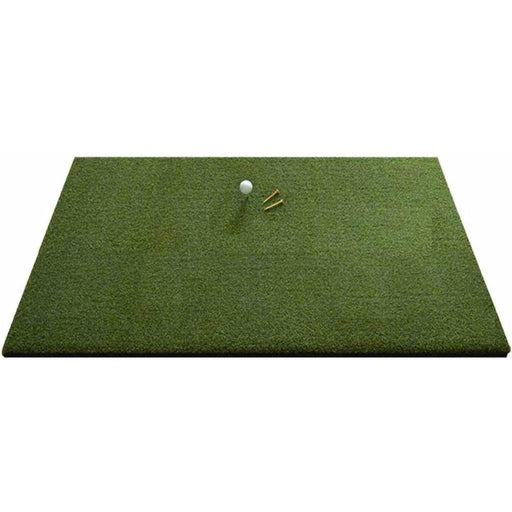
Can a Golf Simulator Truly Lower Your Handicap? Exploring the Pros and Cons
Golf is a game of precision and skill, and golfers are constantly seeking ways to improve their performance and lower their handicap. With the advancement of technology, golf simulators have gained popularity as a tool to enhance practice sessions and provide an immersive indoor golf experience. But can a golf simulator truly lower your handicap? In this blog post, we'll delve into the pros and cons of using a golf simulator as a means to improve your golf game and ultimately reduce your handicap.
The Pros: How Golf Simulators Can Help
- Convenience and Accessibility: One of the most significant advantages of using a golf simulator is its accessibility. Regardless of weather conditions or time of day, golfers can practice their swings and work on different aspects of their game from the comfort of their own homes. This accessibility allows for consistent practice, which is essential for improvement.
- Data Analysis: Golf simulators provide players with instant feedback and comprehensive data on various parameters of their shots, such as clubhead speed, ball speed, launch angle, spin rate, and more. This data-driven approach enables golfers to identify weaknesses and track their progress over time.
- Targeted Practice: Golfers can choose specific courses, holes, or scenarios to practice on using a simulator. This targeted practice can help players work on their weaknesses and develop strategies for challenging holes, which can lead to improved performance on the actual course.
- Swing Improvement: Simulators allow golfers to analyze their swings in detail, enabling them to make adjustments and refinements. With practice and consistent feedback, golfers can develop a more consistent and effective swing, leading to better shots on the course.
The Cons: Considerations to Keep in Mind
- Lack of Real-World Elements: While golf simulators offer a close approximation of real-world golfing, they can't replicate the exact feel of playing outdoors. Factors like wind, terrain variations, and mental pressure are absent in a simulator, and adapting to these conditions is an essential part of improving on the actual course.
- Limited Short Game Practice: Golf simulators often focus on full swings, leaving limited options for practicing short game shots like putting, chipping, and pitching. These aspects of the game are crucial for lowering your handicap, and an exclusive reliance on a simulator may neglect them.
- Dependency on Technology: Relying solely on a golf simulator can lead to a dependency on technology-driven feedback. This can hinder a golfer's ability to self-correct without the assistance of data analysis, which is not available on the course.
- Cost Considerations: High-quality golf simulators can be expensive to purchase and set up. Additionally, some simulators require subscription fees for access to certain courses and features. The initial investment and ongoing costs may not be feasible for all golfers.
Finding the Balance: Integrating Simulators into Your Practice Routine
The key to effectively using a golf simulator to lower your handicap lies in finding the right balance between simulated practice and real-world experience. Here are some tips:
- Complement Outdoor Practice: Use the simulator to work on specific aspects of your swing and game, but don't neglect real-world practice on the course. Incorporate both types of practice to develop a well-rounded game.
- Focus on Transferable Skills: While simulators can help improve swing mechanics, focus on skills that translate directly to the course, such as strategy, shot selection, and mental resilience.
- Varied Practice: Mix up your simulator practice by playing different courses, adjusting settings, and simulating various scenarios. This can help prevent stagnation and keep your practice sessions engaging.
Golf simulators can be a valuable tool for golfers looking to lower their handicap. Their accessibility, data-driven feedback, and targeted practice options make them an attractive option for improving swing mechanics and gaining insight into one's game. However, it's essential to remember that a simulator cannot fully replicate the real-world conditions and challenges that a golfer faces on the course. To truly lower your handicap, a balanced approach that combines simulator practice with real-world play and practice is the most effective strategy.

Have Questions About Golf Simulators?
Our expert team is here to help you find the perfect golf simulator for your needs.
Featured products
-
SkyTrak+
Original price $2,995.00 - Original price $3,145.00Original price$2,995.00 - $3,145.00$2,995.00 - $3,145.00Current price $2,995.00Introducing the SkyTrak+ Launch Monitor: Unmatched Accuracy and Advanced Features Experience a new level of precision and innovation with the SkyTr...
View full details -
ProTee Majestic Simulator Package
Original price $9,618.00 - Original price $13,848.00Original price$9,618.00 - $13,848.00$9,618.00 - $13,848.00Current price $9,618.00ProTee Majestic Golf Simulator Package: Elevate Your Indoor Golf Experience Transform your home or business into a golfer’s dream with the ProTee M...
View full details -
Eagle Golf Mat
Original price $370.00 - Original price $1,130.00Original price $370.00$370.00$370.00 - $1,130.00Current price $370.00Introducing the Eagle Golf Mat: The Ultimate Golf Experience Are you passionate about golf and demand nothing but the very best in your practice eq...
View full details -
Retractable HomeCourse® Golf ProScreen 180
Original price $2,299.00Original price $2,299.00 - Original price $2,299.00Original price $2,299.00Current price $1,999.00$1,999.00 - $1,999.00Current price $1,999.00HomeCourse® Golf ProScreen 180 HomeCourse® Golf ProScreen 180 is a retractable golf screen and enclosure. HomeCourse® Golf ProScreen 180's ballisti...
View full details -
The Augusta V2 4'x12' 2 Cups
Original price $399.00Original price $399.00 - Original price $399.00Original price $399.00Current price $329.00$329.00 - $329.00Current price $329.00The Augusta is one of Big Moss’ traditional models. It offers unmatched versatility for teaching and year round practice. Make a long-term investme...
View full details





